MP Board Solutions for Class 9 Civics Chapter 3 – Electoral Politics
MP Board Solutions for Class 9 Civics Chapter 3 – Electoral Politics are essential for understanding India’s democratic process through elections in the MPBSE curriculum. These well-structured answers help students grasp topics like election campaigns, political parties, voting systems, and fair election practices. Designed as per the latest syllabus, these solutions strengthen conceptual clarity and improve exam preparation. Ideal for revision and practice, they build real-life political understanding, making them a valuable study tool for scoring well in Class 9 Social Science exams.
MP Board Solutions For Class 9 Civics – Electoral Politics – Exercise Images
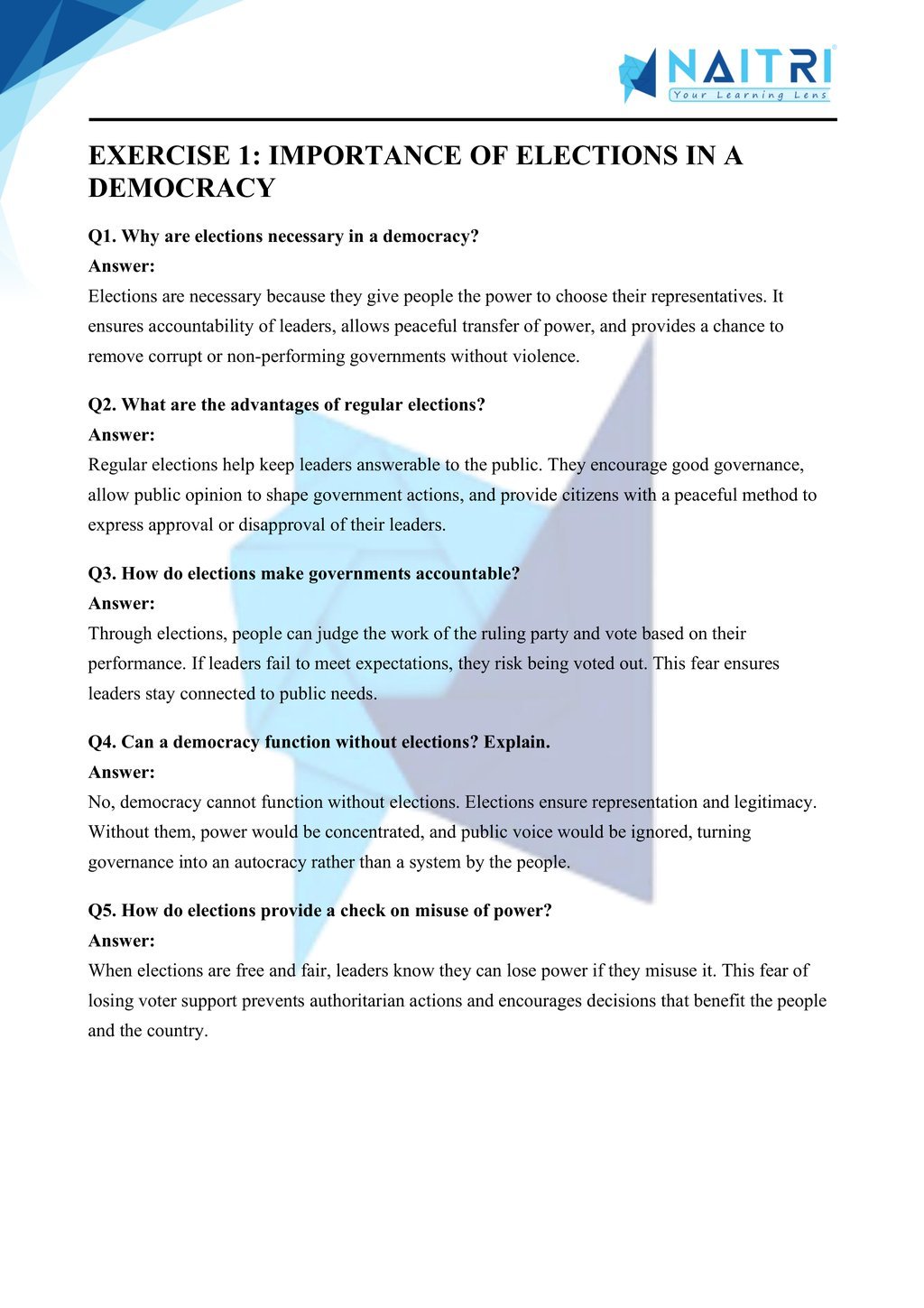
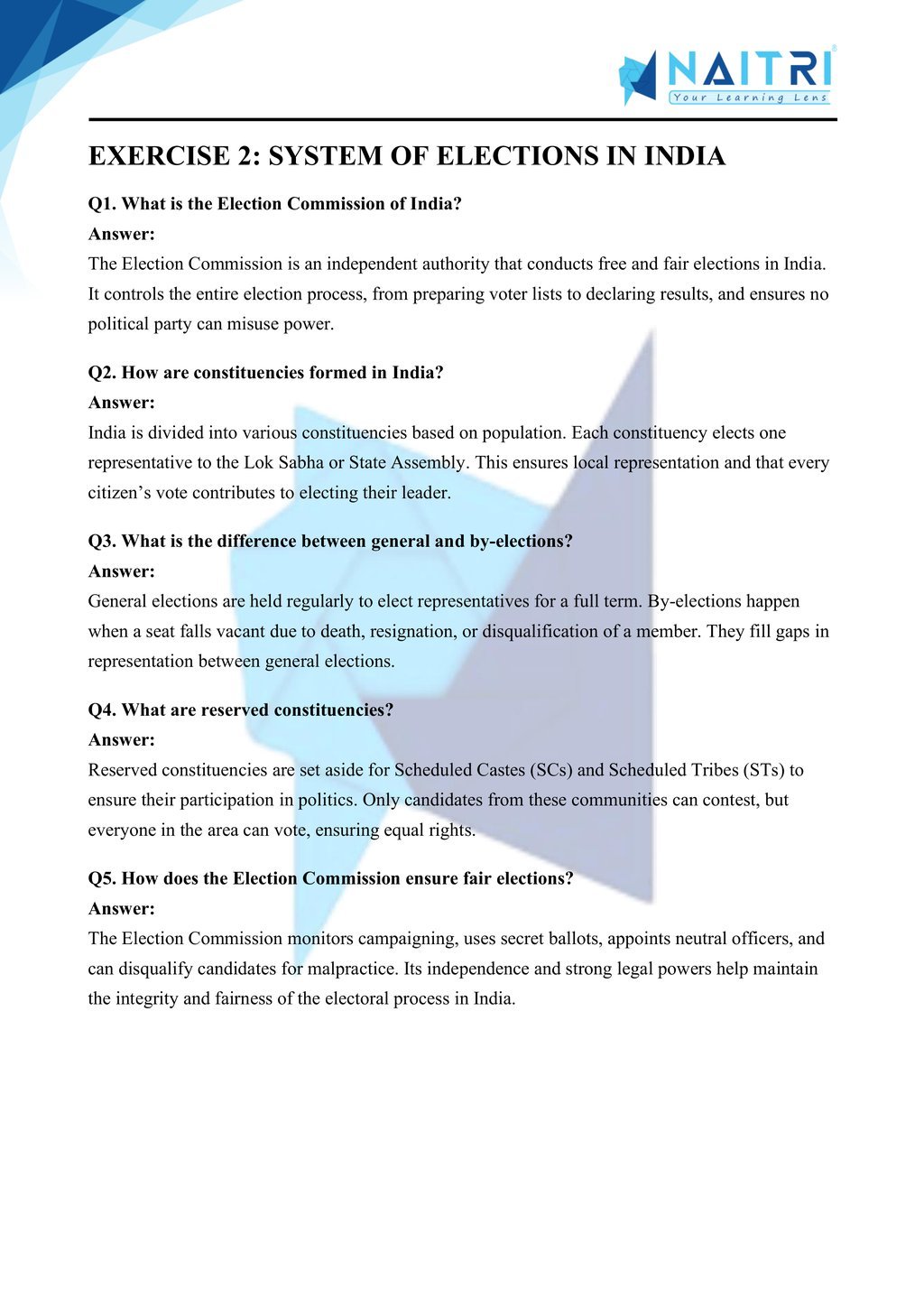
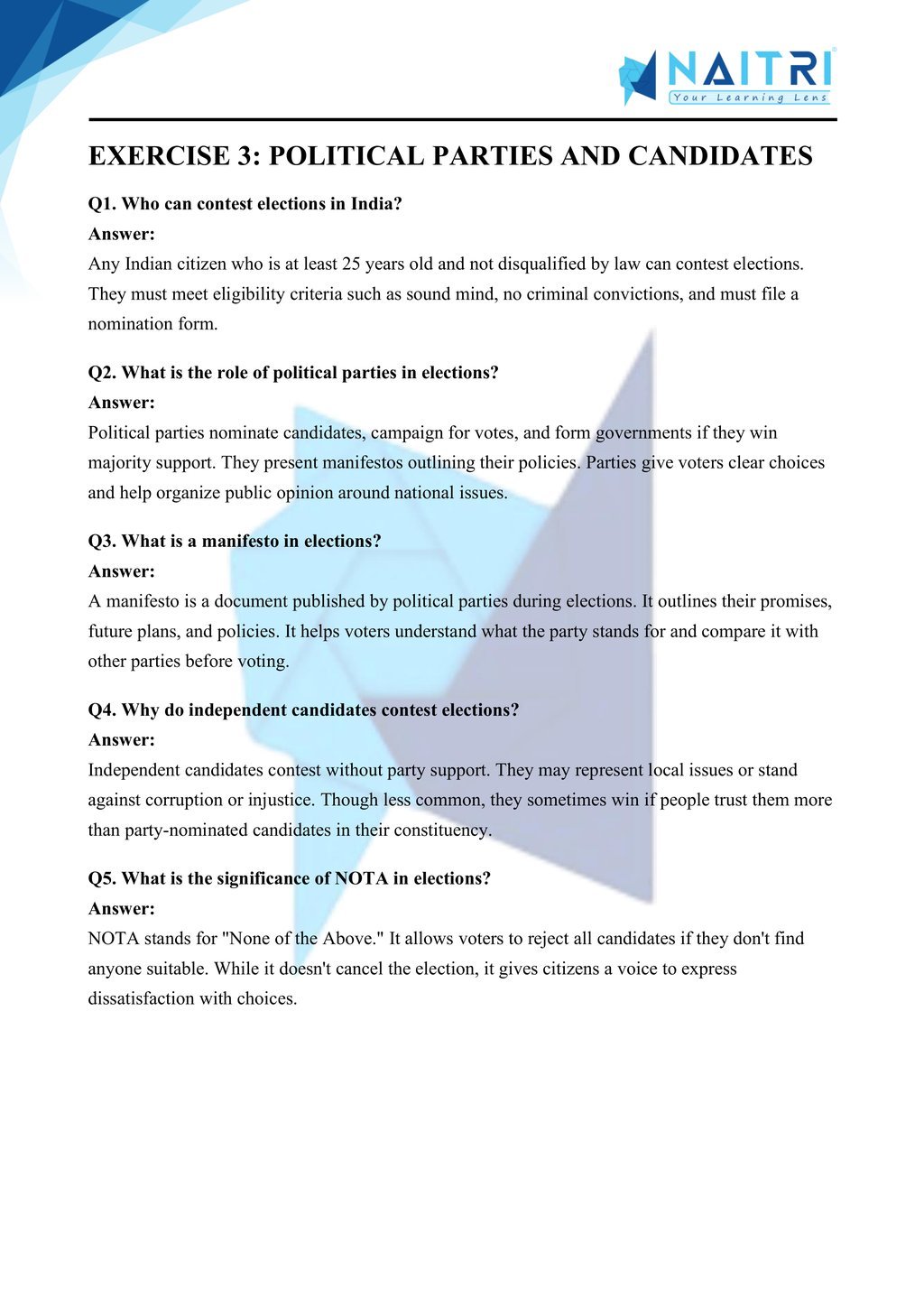
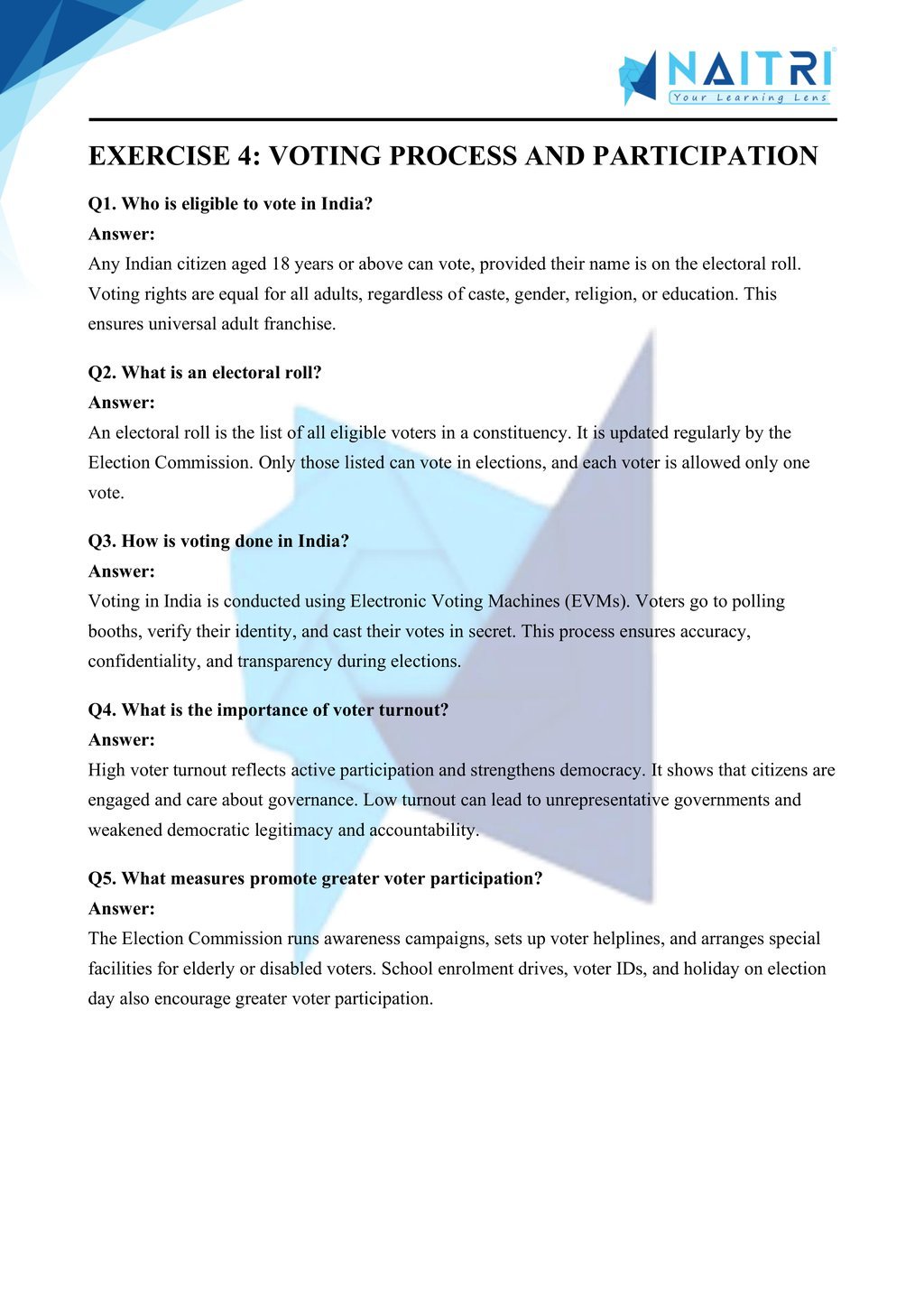
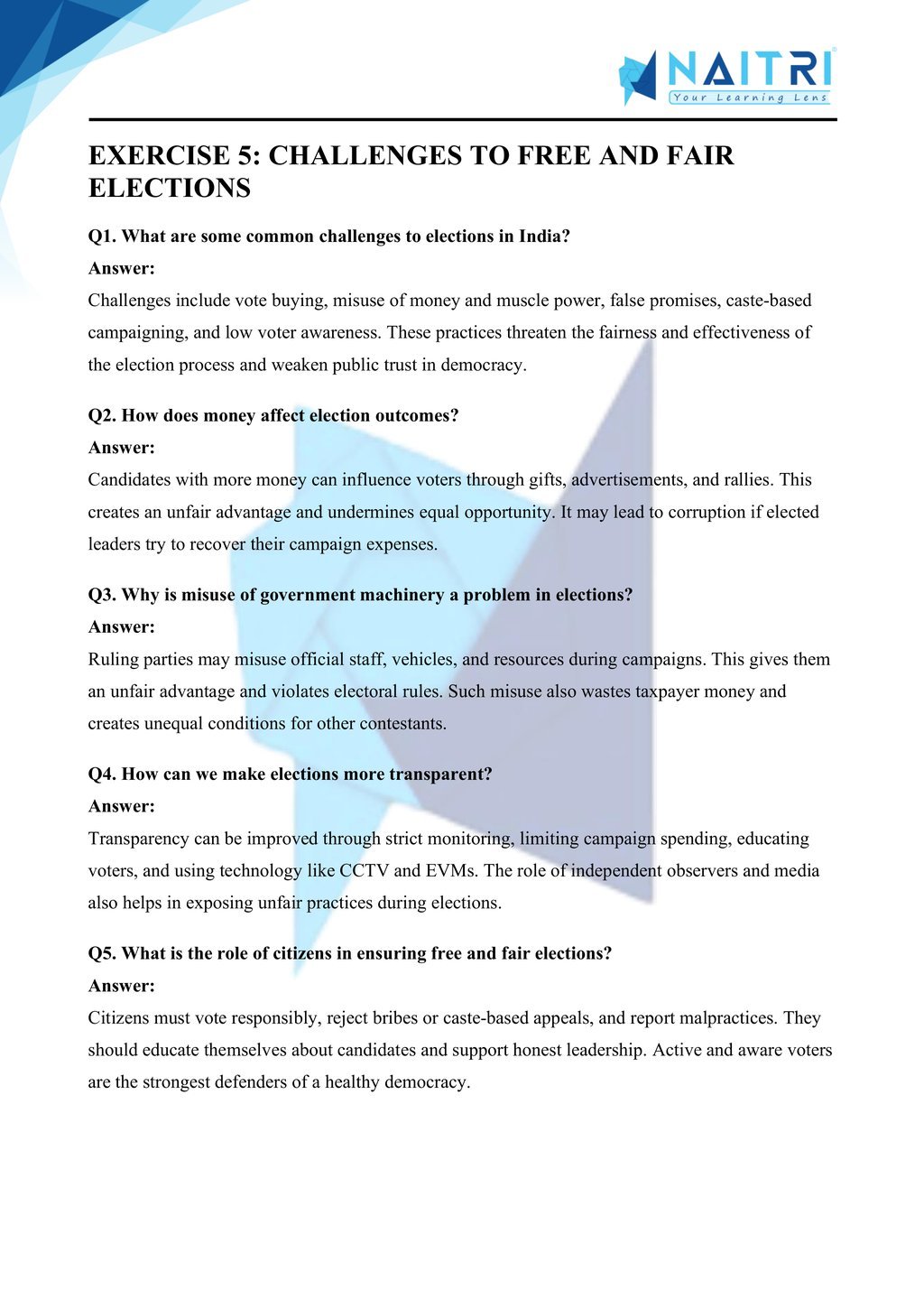
Experience Civics Like Never Before – With AR!
Understanding Electoral Politics is now more exciting and immersive! With the NAITRI App, you can explore complex civics concepts through Augmented Reality (AR). Experience elections happen, campaigns unfold, and voting rights in action — right in front of you. Our AR-powered lessons make learning interactive, 3D, and fun, helping you retain concepts better and enjoy every topic.



Visualize . Interact . Understand . The future of learning is here
Electoral Politics – Important Questions with Answers
What is an election?
Answer: An election is a democratic process where people vote to choose their representatives. It ensures that government is accountable and based on popular support.Why are elections important in a democracy?
Answer: Elections allow people to choose their leaders, change governments peacefully, and make governments accountable to citizens for their decisions and actions.What is the significance of free and fair elections?
Answer: Free and fair elections ensure every citizen can vote freely, without fear or pressure, and that results truly reflect the will of the people.What is a constituency?
Answer: A constituency is a specific geographical area from which a candidate is elected. Each voter in that area casts their vote for one representative.Who can vote in India?
Answer: Every Indian citizen aged 18 or above has the right to vote, regardless of caste, gender, religion, or economic background.What is Universal Adult Franchise?
Answer: Universal Adult Franchise means all adults have the right to vote. It promotes equality, allowing everyone to participate in the electoral process.What are reserved constituencies?
Answer: Reserved constituencies are set aside for SCs and STs to ensure fair representation of marginalized communities in legislative bodies.Who conducts elections in India?
Answer: The Election Commission of India, an independent body, conducts and supervises elections to ensure they are free and fair.What is the Model Code of Conduct?
Answer: It is a set of guidelines issued by the Election Commission to regulate the behavior of political parties and candidates during elections.What is an electoral roll?
Answer: The electoral roll is a list of registered voters in a constituency who are eligible to vote in an election.What is the role of a political party in elections?
Answer: Political parties nominate candidates, campaign, and contest elections with the goal of forming a government based on their policies and ideology.What is the nomination of candidates?
Answer: It is the process where parties or individuals file their candidature with the Election Commission to officially contest an election.What is meant by campaigning in elections?
Answer: Campaigning is the period before elections when candidates and parties promote their views, rally for support, and try to influence voters.What is NOTA in elections?
Answer: NOTA stands for “None of the Above“. It gives voters the right to reject all candidates if they are dissatisfied.How are votes counted in India?
Answer: Votes are counted using Electronic Voting Machines (EVMs). Counting is done under strict supervision to ensure transparency and accuracy.What is the importance of opinion polls?
Answer: Opinion polls predict election trends and give a general idea of public opinion. However, they are not always accurate or reliable.What is an election manifesto?
Answer: A manifesto is a document by political parties stating their promises, plans, and policies if they are elected to power.What is meant by rigging in elections?
Answer: Rigging refers to unfair practices like fake voting, tampering with machines, or threatening voters, which violate the principles of democracy.What is a by-election?
Answer: A by-election is held when a seat in the legislature becomes vacant due to death, resignation, or disqualification of a sitting member.What are the qualifications to contest elections in India?
Answer: A candidate must be an Indian citizen, meet the minimum age requirement, and not be disqualified under any law or court.Why is secrecy of voting important?
Answer: Secrecy ensures voters are free to choose without fear, pressure, or influence, which is crucial for maintaining democratic integrity.How do elections ensure accountability?
Answer: Regular elections force governments to perform well, as poor governance may lead to defeat in the next election cycle.What is a multi-party system?
Answer: A multi-party system is where more than two parties compete in elections and have the potential to form governments either independently or in coalition.How does election campaigning affect voters?
Answer: Campaigns inform voters about candidates, policies, and help them make informed choices, though misleading propaganda can sometimes cause confusion.How can citizens ensure clean elections?
Answer: Citizens must vote responsibly, avoid vote selling, report malpractices, and support ethical candidates to strengthen democratic values.
Electoral Politics explores how elections are conducted in a democracy, focusing on the Indian context. Students learn about the importance of free and fair elections, the role of political parties, voter behavior, and the Election Commission. Using case studies like the Haryana elections, the chapter explains how elections offer people a way to express their will and hold leaders accountable.
Download Naitri App
Easy, Visual Learning — Right on Your Phone
Learn with Augmented Reality! The Naitri app makes CBSE and MP Board concepts interactive and fun — even in low-resource settings. Watch lessons, complete homework, take tests, and track progress — all in one place. Anytime. Anywhere.
Available on








